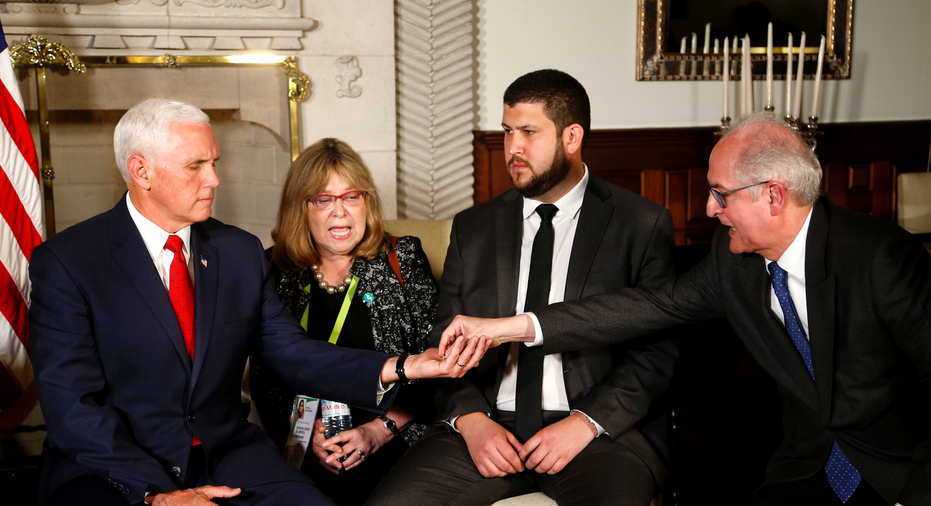Pence urges Latin American allies to isolate Venezuela

LIMA, Peru – Showing solidarity with opposition leaders, U.S. Vice President Mike Pence urged Latin American allies on Friday to further isolate Venezuela, suggesting the Trump administration would seek additional sanctions to counter the country's political crisis.
Pence, in Lima for the Summit of the Americas, announced that the U.S. would provide nearly $16 million in humanitarian assistance to Venezuelans who have fled their country under the rule of President Nicolas Maduro.
"We want one message to be clear: We are with the people of Venezuela," Pence said at the U.S. ambassador's residence, seated with a group of Venezuelan opposition leaders. The vice president called Maduro's government a "dictatorship" and said the U.S. would continue to push a hard line against the country's leadership.
"The U.S. and our allies, I believe, are prepared to do much more," Pence said, accusing Maduro of "refusing humanitarian aid to be delivered to Venezuela." He said the U.S. would push "additional sanctions, additional isolation and additional diplomatic pressure — beginning in our hemisphere but across the wider world."
Pence is subbing for President Donald Trump after the president pulled out of his first planned visit to Latin America to manage the U.S. response to an apparent chemical weapons attack on civilians in Syria.
The White House said Pence would sit down Saturday with Mexican President Enrique Pena Nieto, who has yet to meet with Trump in an impasse over the wall Trump has pledged to build along the U.S.-Mexico border. Pence's meeting with Pena Nieto will follow Trump's calls to send National Guard troops to the border. That adds further tensions as the neighbors, along with Canada, work to renegotiate the North American Free Trade Agreement.
In a series of meetings with Latin American leaders, Pence plans to promote good governance and democratic institutions and urge allies to maintain pressure on Maduro. The U.S. has sanctioned Maduro and dozens of top officials, accusing the country of human rights abuses and sliding into a dictatorship.
With the White House's encouragement, Maduro has been barred from the summit over his plans to hold a presidential election that the opposition is boycotting and that many foreign governments consider a sham. During the meeting with four opposition leaders, Pence listened as they described their once-prosperous country devolving into chaos.
Antonio Ledezma, the former mayor of Caracas, pleaded with Pence through a translator to bolster sanctions against Maduro, asking for "not only humanitarian aid but humanitarian intervention."
The Trump administration is considering imposing an oil embargo on the OPEC nation, while Panama recently said it would pursue sanctions of its own — the first Latin American nation do so — by blacklisting dozens of Venezuelan officials from doing business in the Central American country.
Ana Quintana, a senior policy analyst on Latin America and the Western Hemisphere for the Heritage Foundation, said Pence would seek to "continue the momentum" of U.S. policy on Venezuela. She said the "vast majority of the region's democratic leaders have been so united on addressing the crisis."
Pence will also aim to counter China's attempt to exert more economic influence in the Americas at a time when the Trump administration has been embroiled in a trade dispute with the Chinese. White House officials said the vice president would emphasize the U.S. as the "partner of choice" in Latin American trade, noting that nearly half of the U.S. trade agreements are based in the Western Hemisphere.
Yet the timing of the trade pitch will be delicate. Pence landed in Peru shortly after Trump signaled his interest in possibly rejoining negotiations in the Trans-Pacific Partnership, the Pacific Rim trade pact he frequently blasted during the 2016 campaign, injecting a dose of uncertainty among U.S. trading partners.
Richard Feinberg, a senior fellow in the Latin America Initiative at the Brookings Institution, said it would be difficult for the U.S. to make a case to become the "preferential trading partner" as Trump seeks to upend trade agreements.
"If it means reliable, predictable, Trump is the opposite," Feinberg said. "If preferred means lowering trade barriers, Trump is the opposite of that. He's talking about higher trade barriers and tariffs."
Trump, meanwhile, has long assailed the impact of NAFTA on U.S. workers and has insisted on a new round of negotiations between the U.S., Canada and Mexico on NAFTA. In addition to Pena Nieto, Pence is also planning to meet in Lima with Canadian Prime Minister Justin Trudeau.
The U.S. president has been pushing a tougher line on immigration and seeking stronger protections along the U.S.-Mexican border in recent weeks. The president's recent tweets called on Mexico to halt "caravans" of migrants, many from Honduras, a message that Pence may be asked about in his discussions.
___
On Twitter follow Ken Thomas at https://twitter.com/KThomasDC



















